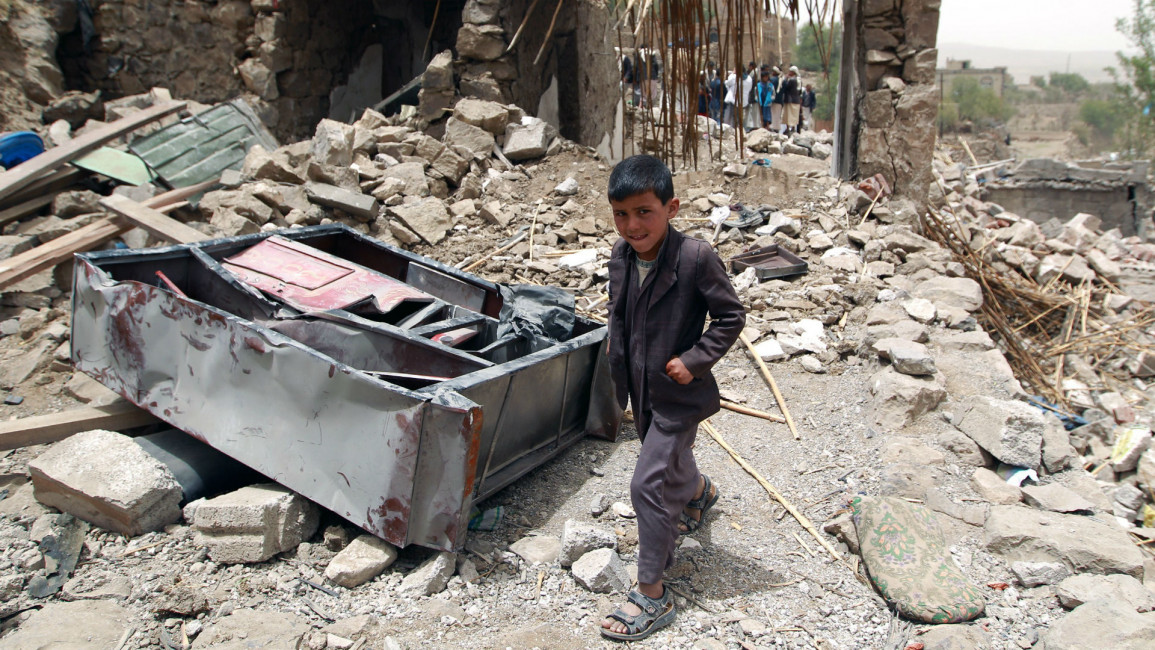
Human tragedy behind the bombing of Yemen
Since the Saudi-led air campaign was launched two weeks ago, the mainstream media have focused on the power politics behind the Yemen conflict rather than the people who have been affected.
Last week the UN, NGOs and aid groups warned that Yemen was on the verge of a humanitarian crisis.
An air raid on al-Mazraq camp on Monday, where hundreds of Yemenis had fled when the bombing began, killed at least 40 people and wounded around 200.
Human Rights Watch said that 400 people fled the camp following the attack.
The Saudi-led campaign has exasperated an already bleak humanitarian situation in Yemen.
Fighting inside the country has also restricted the ability of aid groups, such as the International Committee for the Red Cross, to deliver emergency supplies to people.
Even before the bombing began, Yemen's dire humanitarian situation received scant attention.
'Forgotten crisis'
Last year, the president and CEO of the International Rescue Committee, David Miliband, described Yemen as the "forgotten crisis", which the world had ignored despite it being the poorest country in the Middle East.
A UN appeal for Yemen in 2014 was seriously underfunded, and reflected a lack of commitment from the world in tackling the country’s worsening humanitarian crisis.
Yemenis have suffered unimaginable losses as a result of the fighting.
Natural disasters and political instability have compounded the everyday problems the people face, as well as the government's ability to provide basic services.
In February, it was reported that 10 million Yemenis were in need of food assistance, while 13 million have no access to safe water and sanitation.
Eight million Yemenis lack adequate healthcare. The air raids that have hit most of Yemen's major cities, has made the situation even worse.
The UN has reported that 519 people have been killed since the airstrikes began. Many of those killed were civilians, including around 100 children.
On Saturday the United Nations Security Council convened an emergency session following Russia's plea for a "humanitarian pause" to the bombing.
| Ten million Yemenis were in need of food assistance, while 13 million have no access to safe water and sanitation. |
On the same day in Geneva, the Red Cross called for an immediate ceasefire to allow relief supplies to reach those who have been isolated due to fighting and bombing.
The ceasefire would allow people to rescue dead bodied so that their families could bury their loved ones, the Red Cross said.
There are concerns that international humanitarian law has been repeatedly broken.
Reports from the United Nations Office for the Coordination of Humanitarian Affairs stated that civilian infrastructure has been targeted in the bombing, which is prohibited under international humanitarian law.
The report also said that fighting in Aden has extended to residential areas, which has forced people from their homes. Many city dwellers are returning to their home villages.
Water worries
Internal refugees are one of the most vulnerable groups in the country, and the escalation in the conflict has made their situation worse.
In Septembers 2014, the Internal Displacement Monitoring Centre reported that as of July that year the Yemeni government and United Nations' Refugee Agency reported that there were 334,626 internally displaced people.
The UN has reported that since the air raids began, there have been 100,000 more forced from their homes due to fears of bombing, breakdown in security and gas and electricity being cut off.
Fuel prices are rising fast and there is reportedly no petrol available in Hajjah governorate, which is threatening water supplies.
On Monday, the UN's Office for the Coordination of Humanitarian Affairs, reported that supplies to the governorate's local water and sanitation authorities are expected to run out in matter of days.
Air raids have also hit the water and sanitation infrastructure.
Due to fuel shortages, access to healthcare is getting more difficult, with drugs and medical supplies in short supply.
The situation will only get worse as airports and ports remain closed.
Food prices are continuing to rise with fears that widespread hunger could break out at any moment.
Julien Harneis, representative of the UN's children's fund, recently warned of a food crisis and malnutrition.
Progress that the agency had achieved in reducing malnutrition among children risks being undone and Harneis called on international donors to step up their game.
If a humanitarian crisis is to be averted it is essential that parties to the conflict allow immediate access to aid groups. International donors must also deliver on their promises.
Ultimately, Saudi Arabia must halt its offensive on the country, and warring parties in the conflict should be encouraged to fix their differences diplomatically.
This is the only way we can prevent the civilian population of Yemen suffering further.
Opinions expressed in this article remain those of the author and do not necessarily reflect those of al-Araby al-Jadeed, its editorial board or staff.



